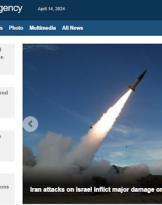It is easy to make historians: we can (simplistically) say that we collect data and chronicles after many years, we purge them (as far as "if" possible) from the partialities of judgment and then tell a period or an event.
Another thing is to predict the evolution of the present when the climate is hot, the truth is uncomfortable and maybe you go to an environment that is not accustomed to criticism.
I happened yesterday to re-read an article - which I propose to follow - by General Bernardi published in the newspaper Defense Pages in 2003.
For my part, there can only be admiration for the foresight and courage shown by a soldier.
However, I leave the readers evaluations and comments.
"Iraq, the mistake of dissolving the army"
The dripping of the deaths of American soldiers in Iraq is having more impact on American and world public opinion than were the losses during the operational phase. From what appears, it does not seem that the attacks are managed by a form of organized resistance, but rather that they are isolated episodes, but converging on a single objective: the US army. Among the various causes to which the phenomenon can be attributed, one should not be overlooked: the dissolution of the Iraqi army, which took place a few days after the conquest of Baghdad.
The armed forces around the world have a characteristic that distinguishes them from all other sectors of public life: military honor. It is a feeling that makes their thinking, their activity, their dedication regardless of the political context in which they operate. The military of the whole world is military and that's it; they can also be enemies and fight against each other as their governments are enemies, but nevertheless respect for the uniform remains, for the person who wears it and for the oath he has given.
"I looked at the general and saw, or seemed to me, the shadow of a smile. In any case, his intervention deserved a military salute. I greeted him, in fact, before returning to the column that was heading towards captivity." The writer is the British general brigadier Desmond Young, captured in North Africa. The general to whom he refers is Erwin Rommel. Young's book, one of Rommel's most famous biographies, is just one of the infinite examples of camaraderie among enemies (or former enemies) that can be found in war literature.
Not only that, the same examples are also experienced today. The Italian officials who are now working together with the former enemies of the Warsaw Pact know this well. What exceeds being enemies or friends is dressing uniform. Those of the navies of the whole world are even almost equal. In most cases, the military is out of political life. So much so that fascism had to establish departments of Black Shirts to have an armed body loyal to political ideology. Nazism created the Gestapo and the SS. Iraq had the Republican Guard.
The mistake the Americans made was to consider the army defeated and to deprive it of the dignity of which it was dressed in its society. It is not a mistake to think that the humiliated loser takes revenge and that the attacks are the work of (or favored by) former soldiers no longer in uniform. Some of these soldiers no longer young have attended academies and war schools in the West (the Italian naval academy has hosted Iraqi students for years), they have absorbed the mentality, the way of doing. Today they are reduced to pick up the "unemployment benefit" from the hands of the winner.
The US has betrayed that feeling of camaraderie that unites the armed forces around the world. The situation would have been very different if, purged of the army of the highest ranks (which however were affected by the political climate), the Americans had immediately reconstituted the military units with the younger officers. Today, as critical as it is, the situation would be substantially different, with Iraqi troops alongside the American ones and of great support in controlling the territory. And it is beyond doubt that they know this territory better.
Giovanni Bernardi, 4 August 2003
(photo: US DoD archive)












